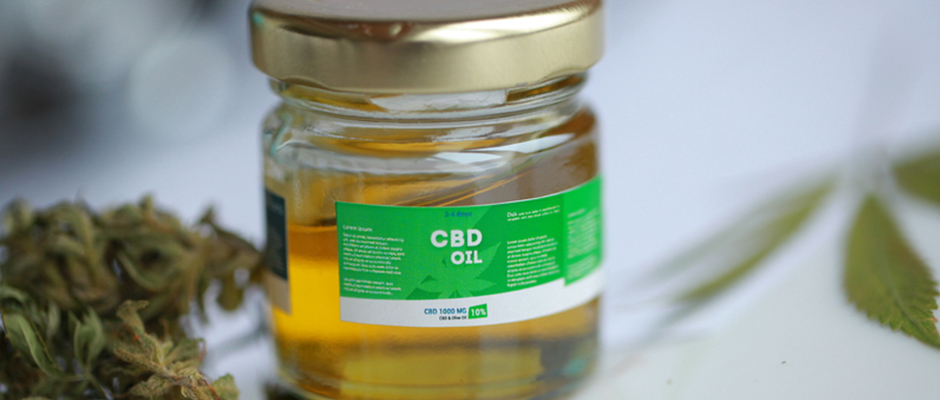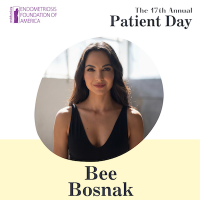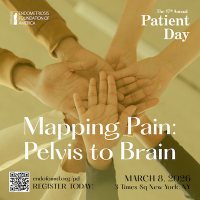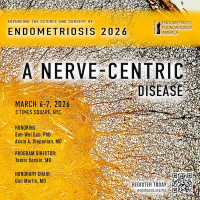
—With additional reporting by Joanie Cox-Henry
Can CBD oil help relieve the misery of chronic endometriosis pain? That’s the question we asked our community via Facebook, Instagram and Twitter and the response was overwhelmingly positive.
“Yes,” wrote @michelleaveryjewelry, “I have my medical license and use CBD only and a 50:50 [ratio of] CBD to the THC oil. It does help the pain. I am off narcotics.”
“It really does help," @nycgyno answered. "I am doing research on it with some patients, and most of them are very happy with the results and the relief.”
But, not everyone agreed. Endometriosis pain is a highly individualized experience, and CBD oil is not one size fits all.
According to @therealkatedavey, “For me post-excision surgery, two years out, CBD oil really helps my bad pain days. But I had to find one that worked for me. And that’s my experience…not everything works for everyone.”
So, it’s neither silver bullet nor the old fashion “snake oil” conjured up by traveling quacks from the backs of wagons in 19th century frontier days and foisted off on a naïve public as a cure-all—though real snake oil is used in China—plant-based preparations including marijuana do have a long and respectable history in the traditional medicines of some cultures.
Marijuana only became illegal in the U.S. with the passage of the Controlled Substances Act in 1970, though regulation rumblings had been growing since the 1920s.
Pharmaceutical-grade CBD oil, or cannabidiol oil, is derived from the cannabis plant and can be packaged in a variety of forms: gel cap, cream, oil, salve, tincture, or maybe even a transdermal or skin patch. Its effect is not the same as smoking and doesn’t produce the same cloudy euphoria and munchie giggles as the roll-your-own stuff you might have enjoyed in your college days.
Though @kadine_christie said “supposedly CBD oil shouldn't get you high, but I hated every minute of it. It was [a] terrible feeling.” And one commenter noted, “I’m a working woman, a freelancer in the corporate world. I cannot afford to feel high.”
In many states, obtaining CBD products requires a doctor’s prescription. In others, it’s just plain illegal, though that appears to be changing rapidly.
California became the first state to legalize medical marijuana in 1996. This year, the state began to allow sales for recreational use, but the California Department of Public Health stated that, “Until the Food and Drug Administration (FDA) rules that industrial hemp-derived CBD oil and CBD products can be used as a food or California makes a determination that they are safe to use for human and animal consumption, CBD products are not an approved food, food ingredient, food additive or dietary supplement.”
The state agency explained, CBD and CBD oil are “allowable only in edible cannabis products that are produced according to the California Medicinal and Adult-Use Cannabis Regulations and Safety Act including a source, manufacturing, distribution, testing and retail supply chain that is completely separate from regular foods and beverages.”
Though there’s something about the phrase “industrial hemp” that doesn’t feel quite right, recent news reports indicate that Coca-Cola is seriously interested in adding the product to its popular line of the soft drink which traces its root recipe back to cocaine.
Could artisanal "Can"-Cola be far away?
In June, the FDA made history when it approved the use of a purified form of CBD oil to treat seizures in two “rare and severe” forms of epilepsy. Dr. Orrin Devinsky, director of NYU Langone Epilepsy Center, noted at the time, “It’s very important to highlight that the drug used in this study, cannabidiol, was…purified to 99 percent purity.”
It's promising news for CBD fans, but Devinsky also made it clear that buyers should beware. “This is not something you can get from a dispensary today. It is a very specific pharmaceutical-grade product.”
Despite the fact that @heavers_said, “It’s my saving grace” and Vitamin Weed author Dr. Michele Ross, Ph.D. swears by the stuff, there is not a lot of authoritative clinical evidence for its effectiveness.
Lately, inboxes have been filling up with a rising tide of emails recruiting volunteers, but only a few seem to have some degree of scientific authenticity—and those results aren’t in yet.
Director of the Brain Institute of the University of Utah, Deborah Yurgelun-Todd is “testing the analgesic effects of orally-dosed Cannabidiol on subjects with non-cancer pain.”
Canada seems to be a sweet spot for legitimate clinical trials.
That’s where Ramesh Zacharias, the Medical Director of Hamilton Health Sciences Corporation in collaboration with the Michael G. DeGroote Institute for Pain Research and Care at McMaster University in Hamilton, Ontario and Dr. Antonio Vigano and Dr. Maria Fernanda Arboleda of McGill University in Montreal are doing related studies.
These studies have passed the rigorous rules of the Institutional Review Boards of the respective university.
And if you’re thinking of buying a bottle from Amazon or any other online source, remember this warning.
“Among CBD products purchased online, a wide range of CBD concentrations was found, consistent with the lack of accepted dose. Of products tested, 26 percent contained less CBD than labeled which could negate any potential clinical response. The over labeling of CBD products in this study is similar in magnitude to levels that triggered warning letters to 14 businesses in 2015-2016 from the U.S. Food and Drug Administration (e.g., Actual CBD content was negligible or less than 1 percent of the labeled content).”
That’s according to a study published online last year by the Journal of American Medical Association entitled “Labeling Accuracy of Cannabidiol Extracts Sold Online”.
And it’s nothing to fool with. “There is evidence," according to Dr. Tomar Singer, director of reproductive endocrinology and infertility at the Lenox Hill Hospital in New York City, “that cannabis oil or cannabidiol can decrease fertility by affecting ovulation and implantation.”
That would be a high price to pay.









